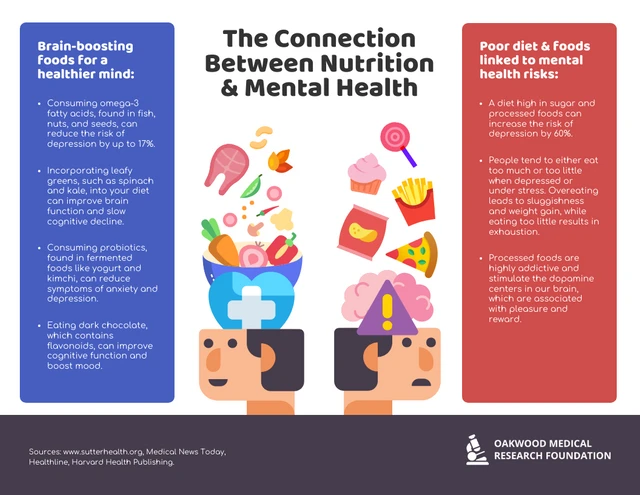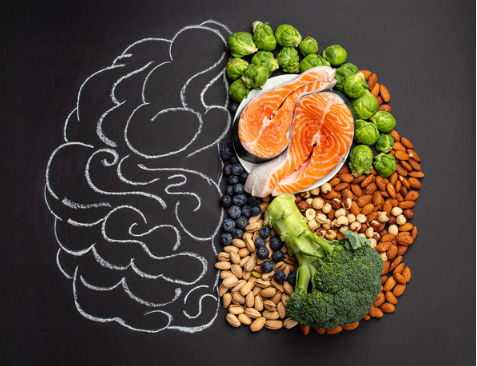Nutrition plays a crucial role in mental health by influencing brain function and mood. Healthy eating can help prevent mental health disorders.
Maintaining a balanced diet is essential for overall well-being. Nutrients like omega-3 fatty acids, vitamins, and minerals support brain health. Consuming whole foods, such as fruits, vegetables, and lean proteins, can improve mental clarity and emotional stability. Poor nutrition, on the other hand, can lead to mood swings, anxiety, and depression.
Proper hydration is also vital, as it affects cognitive function. Prioritizing a nutritious diet fosters both physical and mental health, creating a foundation for a happier life. Incorporating mindful eating habits can enhance mental resilience and improve quality of life.

Credit: venngage.com
Introduction To Nutrition And Mental Health
Nutrition plays a key role in mental health. Eating the right foods can boost mood. The brain needs nutrients to function well. Poor diet can lead to mental health issues.
The Connection
The brain and gut are closely linked. Scientists call this the gut-brain axis. Good gut health can improve brain health. Healthy foods support this connection. Unhealthy foods can harm it.
Importance Of Diet
A balanced diet is crucial for mental health. It provides essential nutrients. These nutrients help the brain work well. A poor diet can lead to mental health problems.
| Food Type | Benefits |
|---|---|
| Fruits and Vegetables | Rich in vitamins and minerals |
| Whole Grains | Provide sustained energy |
| Lean Proteins | Support brain function |
| Healthy Fats | Improve mood and brain health |
Eating a variety of foods is key. Each type of food offers different benefits. A balanced diet includes fruits, vegetables, whole grains, lean proteins, and healthy fats.
- Fruits and vegetables are rich in vitamins and minerals.
- Whole grains provide sustained energy.
- Lean proteins support brain function.
- Healthy fats improve mood and brain health.
Consider these tips for a healthy diet:
- Eat a rainbow of fruits and vegetables.
- Choose whole grains over refined grains.
- Include lean proteins like chicken and fish.
- Add nuts and seeds for healthy fats.
Nutrients That Boost Mental Health
Good nutrition is key to mental health. Certain nutrients have a big impact on your brain. These nutrients can help improve mood, focus, and overall mental well-being.
Vitamins And Minerals
Vitamins and minerals play a big role in brain function. They help regulate mood and reduce anxiety. Here are some key vitamins and minerals for mental health:
- Vitamin D: Helps fight depression and anxiety.
- Vitamin B12: Boosts energy and improves mood.
- Folate (Vitamin B9): Essential for brain function and mood regulation.
- Magnesium: Helps calm the nervous system.
- Zinc: Supports cognitive function and mood stability.
Ensure you get enough of these vitamins and minerals through diet or supplements. Foods like leafy greens, nuts, seeds, and fish are rich in these nutrients.
Omega-3 Fatty Acids
Omega-3 fatty acids are crucial for brain health. They help reduce inflammation and improve brain function. There are two main types of omega-3s important for mental health:
- EPA (Eicosapentaenoic Acid): Reduces symptoms of depression.
- DHA (Docosahexaenoic Acid): Supports brain structure and function.
To get enough omega-3s, eat foods like fatty fish (salmon, mackerel), chia seeds, and walnuts. You can also take fish oil supplements if needed.
A balanced diet rich in these nutrients can significantly boost mental health. Consider incorporating these vitamins, minerals, and omega-3 fatty acids into your daily routine for better mental well-being.
Impact Of Sugar And Processed Foods
The food we eat affects our brain. Sugar and processed foods can harm mental health. They can change how we feel and think. Understanding this is important.
Sugar’s Effect On Mood
Sugar gives a quick burst of energy. This can make us feel happy for a short time. But after the sugar rush, we feel tired and sad. This makes our mood go up and down.
Eating too much sugar can lead to anxiety. It can also cause irritability. These mood changes can affect daily life. It’s important to control sugar intake.
Processed Foods And Depression
Processed foods often contain unhealthy fats and additives. These can harm our brain. Eating these foods regularly can increase the risk of depression.
Studies show a link between processed foods and mental health issues. These foods lack the nutrients our brain needs. Instead, they offer empty calories.
| Healthy Foods | Unhealthy Foods |
|---|---|
| Fruits | Candy |
| Vegetables | Chips |
| Whole grains | Soda |
Choosing healthy foods can improve our mood. It can also reduce the risk of depression. It’s wise to avoid processed foods for better mental health.
Gut-brain Connection
The gut-brain connection is a powerful link between our digestive system and our mental health. This connection shows how what we eat can directly affect our brain and mood. The gut and brain communicate through a complex network of nerves, chemicals, and hormones. Understanding this connection can help improve mental well-being through better nutrition.
Role Of Probiotics
Probiotics are live bacteria that are good for your gut health. They help maintain a healthy balance of gut bacteria. These bacteria play a key role in producing neurotransmitters like serotonin, which influences mood and sleep.
- Probiotics can be found in foods like yogurt, kefir, and sauerkraut.
- They help reduce symptoms of anxiety and depression.
- Probiotics support a healthy gut lining, preventing harmful bacteria from entering the bloodstream.
Impact Of Gut Health
Good gut health is essential for maintaining a healthy brain. The gut is often referred to as the “second brain” because it produces many of the same neurotransmitters as the brain.
A healthy gut can help improve:
- Mood: A balanced gut microbiome can reduce feelings of stress and anxiety.
- Cognitive Function: Proper gut health supports better memory and focus.
- Sleep: A healthy gut can improve sleep quality by regulating sleep-related hormones.
To maintain good gut health, consider including these foods in your diet:
| Food | Benefits |
|---|---|
| Fibrous Vegetables | Promote healthy digestion and regularity. |
| Fermented Foods | Increase beneficial gut bacteria. |
| Whole Grains | Provide essential nutrients and fiber. |
Maintaining a balanced diet rich in probiotics and other gut-friendly foods can enhance mental health. By focusing on gut health, you can support your overall well-being and happiness.
Dietary Patterns And Mental Health
The food you eat can affect your mind. Healthy dietary patterns help improve mental health. Some diets are better for the brain than others. Let’s explore two popular diets.
Mediterranean Diet
The Mediterranean diet is rich in fruits, vegetables, and whole grains. It includes nuts, seeds, and healthy fats like olive oil. This diet also has fish, which provides omega-3 fatty acids.
Studies show this diet reduces symptoms of depression. People following this diet feel happier and less anxious. The diet also helps improve memory and focus.
| Food Group | Examples |
|---|---|
| Fruits & Vegetables | Tomatoes, Spinach, Oranges |
| Whole Grains | Oats, Brown Rice, Barley |
| Healthy Fats | Olive Oil, Avocados, Nuts |
| Fish | Salmon, Sardines, Mackerel |
Plant-based Diet
A Plant-Based diet focuses on fruits, vegetables, and legumes. It avoids animal products like meat and dairy. This diet provides many vitamins, minerals, and antioxidants.
People who follow this diet often have better mental health. They report fewer mood swings and lower stress levels. The diet also supports overall brain function.
- Fruits: Apples, Bananas, Berries
- Vegetables: Broccoli, Carrots, Kale
- Legumes: Lentils, Chickpeas, Black Beans
- Whole Grains: Quinoa, Millet, Farro
Choosing the right diet can improve your mood and mental health. Both the Mediterranean and Plant-Based diets offer many benefits. Eating well can help your mind stay healthy.
Hydration And Mental Clarity
Staying hydrated is crucial for mental clarity. The brain needs water to function well. A lack of water can make thinking hard. Let’s dive into why water is so important for the mind.
Importance Of Water
Water makes up about 75% of the brain. It helps with brain functions. When the brain has enough water, it can think clearly. Water also helps with mood and memory. Below are key points on why water is important:
- Helps with brain functions
- Improves mood
- Boosts memory
Effects Of Dehydration
Dehydration happens when you don’t drink enough water. This can lead to many problems. The brain might feel slow and foggy. Dehydration can also cause headaches. Here are some effects of dehydration:
| Effect | Description |
|---|---|
| Brain Fog | Hard to think clearly |
| Headaches | Pain in the head |
| Mood Swings | Feeling grumpy or sad |
To avoid dehydration, drink plenty of water each day. Here are some tips to stay hydrated:
- Carry a water bottle
- Drink water with meals
- Eat water-rich foods like fruits
Role Of Antioxidants
Antioxidants are vital for protecting the brain from damage. They fight free radicals and help maintain brain health. Eating foods rich in antioxidants can boost mental well-being.
Sources Of Antioxidants
Many foods are rich in antioxidants. Here are some top sources:
- Berries: Blueberries, strawberries, and raspberries
- Dark Chocolate: High in cocoa content
- Nuts: Almonds, walnuts, and pecans
- Vegetables: Spinach, kale, and broccoli
- Fruits: Oranges, grapes, and kiwi
Benefits For The Brain
Antioxidants offer many benefits for brain health:
- Reduce Inflammation: Lower levels of brain inflammation.
- Boost Mood: Improve overall mood and reduce anxiety.
- Enhance Memory: Better memory and cognitive function.
- Protect Neurons: Shield brain cells from damage.
Antioxidant-rich Foods Table
| Food | Antioxidant Type |
|---|---|
| Blueberries | Anthocyanins |
| Dark Chocolate | Flavonoids |
| Spinach | Vitamin C, Vitamin E |
| Walnuts | Vitamin E |
| Oranges | Vitamin C |

Credit: www.linkedin.com
Practical Tips For A Mental Health-friendly Diet
Eating well can boost your mood and mental health. Here are some practical tips for a diet that supports your mind. Follow these guidelines to feel better every day.
Meal Planning
Planning your meals can make a huge difference. It helps you avoid unhealthy choices.
- Make a weekly meal plan. Include lots of fruits and vegetables.
- Choose whole grains like brown rice or oats.
- Include lean proteins such as chicken, fish, and beans.
- Drink plenty of water. Avoid sugary drinks.
Use this simple table to start planning:
| Day | Breakfast | Lunch | Dinner |
|---|---|---|---|
| Monday | Oatmeal with berries | Grilled chicken salad | Quinoa with veggies |
| Tuesday | Smoothie with spinach and banana | Turkey sandwich on whole grain bread | Salmon and steamed broccoli |
Healthy Snack Ideas
Snacking can be healthy and tasty. Choose snacks that boost your brain.
- Nuts and seeds: Almonds, walnuts, and sunflower seeds are great.
- Fruits: Apples, bananas, and berries are perfect for quick energy.
- Yogurt: Choose plain yogurt and add fresh fruit.
- Veggie sticks: Carrots, celery, and cucumber with hummus.
- Whole grain crackers: Pair with cheese or avocado.
Remember, your diet affects your mental health. Plan meals and choose healthy snacks. Feel better with each bite you take.

Credit: fastercapital.com
Conclusion
Proper nutrition significantly impacts mental health. Balanced diets boost mood, reduce anxiety, and improve cognitive function. Prioritize nutrient-rich foods for mental wellness. Remember, your diet influences both body and mind. Make healthy eating a daily habit to support mental health and overall well-being.

